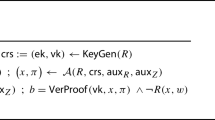Abstract
Schöning [S] introduced a notion of helping and suggested the study of the class Phelp(C) of languages that can be helped by oracles in a given classC. He showed that Phelp(BPP) is included in ZPP. Later, Ko [K] introduced a weaker notion of helping, called one-sided helping, and proved that P1-help(BPP) is included in R and that UP is included in P1-help(UP). The three inverse inclusions are open problems (see [Hem]). Caiet al. [CHV] constructed a relativized world in which the third open inclusion fails. We show relativized worlds in which all three open inclusions fail in a strong way. In particular, we strengthen the result of Caiet al., showing that Phelp(UP) is not included in Few. This is obtained as a corollary of a general result that gives sufficient conditions, on a relativizable complexity classC, to ensure the relativized separation of Phelp(UP) fromC. Further separations are also derived. The other two open inclusions are showed to fail strongly by the relativized separation of ZPP from P1-help(AM ∩ co-AM).
Similar content being viewed by others
References
L. Babai, Trading Group Theory for Randomness,Proc. 17th ACM Symposium on Theory of Computing, 1985, pp. 421–429.
J. L. Balcázar, Self-Reducibility,Journal of Computer and System Sciences 41(1990), 367–388.
D. P. Bovet and P. Crescenzi,Introduction to the Theory of Complexity, Prentice-Hall, Englewood Cliffs, NJ, 1994.
D. P. Bovet, P. Crescenzi, and R. Silvestri, Complexity Classes and Sparse Oracles,Proc. 6th Structure in Complexity Theory Conference, 1991, pp. 102–108. AlsoJournal of Computer and System Sciences 50 (1995), 382–390.
D. P. Bovet, P. Crescenzi, and R. Silvestri, A Uniform Approach to Define Complexity Classes,Theoretical Computer Science 104 (1992), 263–283.
J. L. Balcázar, J. Díaz, and J. Gabarró,Structural Complexity I, vol. 1, Springer-Verlag, Berlin, 1988.
J. L. Balcázar, J. Díaz, and J. Gabarró,Structural Complexity II, vol. 2, Springer-Verlag, Berlin, 1990.
M. Blum and R. Impagliazzo, Generic Oracles and Oracle Classes,Proc. 28th IEEE Symposium on Foundations of Computer Science, 1987, pp. 118–126.
B. Borchert, On the Acceptance Power of Regular Languages,Proc. 11th Symposium on Theoretical Aspects of Computer Science, Lecture Notes in Computer Science, Vol. 775, Springer-Verlag, Berlin, 1994, pp. 533–541.
J. Cai and L. Hemachandra, On the Power of Parity Polynomial Time,Mathematical Systems Theory 23 (1990), 95–106.
J. Cai, L. Hemachandra, and J. Viskoč, Promises Problems and Access to Unambiguous Computation,Proc. 17th Symposium on Mathematical Foundations of Computer Science, Lecture Notes in Computer Science, Vol. 629, Springer-Verlag, Berlin, 1992, pp. 162–171.
L. Hemachandra, Fault-Tolerance and Complexity,Proc. 20th International Colloquium on Automata, Languages, and Programming, Lecture Notes in Computer Science, Vol. 700, Springer-Verlag, Berlin, 1993, pp. 189–202.
U. Hertrampf, Complexity Classes Defined viak-Valued Functions,Proc. 9th Structure in Complexity Theory Conference, 1994, pp. 224–234.
U. Hertrampf, Complexity Classes with Finite Acceptance Types,Proc. 11th Symposium on Theoretical Aspects of Computer Science, Lecture Notes in Computer Science, Vol. 775, Springer-Verlag, Berlin, 1994, pp. 543–553.
J. Hartmanis and L. A. Hemachandra, Robust Machines Accept Easy Sets,Theoretical Computer Science 74 (1990), 217–225.
L. Hemachandra and S. Jain, On the Limitations of Locally Robust Positive Reductions,International Journal of Foundations of Computer Science 2 (1991), 237–255.
U. Hertrampf, C. Lautemann, T. Schwentick, H. Vollmer, and K. W. Wagner, On the Power of Polynomial Time Bit-Reductions,Proc. 8th Structure in Complexity Theory Conference, 1993, pp. 200–207.
R. Impagliazzo and M. Naor, Decision Trees and Downward Closures,Proc. 3rd Structure in Complexity Theory Conference, 1988, pp. 29–38.
K. Ko, On Helping by Robust Oracle Machines,Theoretical Computer Science 52 (1987), 15–36.
N. Nisan, CREW PRAMs and Decision Trees,SIAM Journal on Computing 20 (1991), 999–1007.
C. Rackoff, Relativized Questions Involving Probabilistic Algorithms,Journal of the ACM 29 (1982), 261–268.
U. Schöning, Robust Algorithms: a Different Approach to Oracles,Theoretical Computer Science 40 (1985), 57–66.
G. Tardos, Query Complexity, or Why is it Difficult to Separate NPA ∩ co-NPA from PA by Random Oracles,Combinatorica 9 (1989), 385–392.
N. K. Vereshchagin, Relativizable and Nonrelativizable Theorems in the Polynomial Theory of Algorithms,Russian Academy of Sciences. Izvestiya. Mathematics (AMS) 42 (1994), 261–298.
T. Yamakami, Structural Properties for Feasibly Computable Classes of Type Two,Mathematical Systems Theory 25 (1992), 177–201.
Author information
Authors and Affiliations
Rights and permissions
About this article
Cite this article
Cintioli, P., Silvestri, R. Helping by unambiguous computation and probabilistic computation. Theory of Computing Systems 30, 165–180 (1997). https://doi.org/10.1007/BF02679447
Received:
Accepted:
Published:
Issue Date:
DOI: https://doi.org/10.1007/BF02679447




